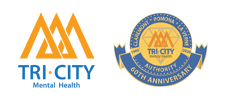Community centers provide an important place where people can develop support systems, take classes, and learn new ways to improve their wellness, independence and self-reliance. Many community spaces temporarily closed or suspended in-person programs due to the COVID-19 pandemic and public health guidelines.
The Tri-City Wellness Center, a drop-in community hub located in Pomona, remained open and responsive during the pandemic and has since been easing back into offering in-person activities.
“Pre-COVID, we provided over seventy support groups and, during the pandemic, we adapted and pivoted to virtual programming with forty telehealth groups,” said Tri-City Wellness Center Manager, Gamaliel Polanco. “Over the past year, we started to offer groups with limited capacity to keep everything physically distanced. With L.A. County guidelines, we’re excited to resume normal operations at full capacity and offer in-person programming to support our community.”
Established in 2011 through funding from Proposition 63, known as the Mental Health Services Act (MHSA), the Tri-City Wellness Center offers an extensive array of programs for the whole family, children, young adults, adults, older adults and the community in general. Visitors to the center can engage in a variety of services and supports including forty — now in-person —peer and family support groups, parenting classes, employment vocational services, computer lab, educational workshops, recreational activities and community resources.
“What makes our center so unique is all of our services are free,” said Polanco. “Folks can come here and if they need additional support, we can tailor our services to meet them wherever they are at. That could be family support, employment and financial support, mental health support, and it’s all accessible for everyone.”
Now more than ever, communal spaces are important for helping foster and reinforce our connections and relationships. In a recent public health advisory, the U.S. Surgeon General Dr. Vivek Murthy called attention to the “devastating impact of the epidemic of loneliness and isolation” in the United States. About half of adults in the country reported measurable levels of loneliness, which can affect our individual and collective health and well-being. Those trends were already underway well before the COVID-19 pandemic, though living through three years of a public health crisis has likely accelerated them.
According to the 81-page advisory, feelings of isolation and loneliness may be rising because Americans’ social networks and interactions are in decline. In 2021, 49 percent of adults reported having three or fewer friends, compared to about 27 percent in 1990, per the report. For young people ages 15 to 24, time spent in-person with friends fell from about 150 minutes per day in 2003 to 40 minutes per day in 2020—an almost 70 percent drop.
The health risks associated with prolonged loneliness are dramatic — akin to smoking up to fifteen cigarettes a day, per Murthy’s advisory report. Social isolation and loneliness can contribute to a person having a higher risk of heart disease, stroke, anxiety, depression, and dementia, and make people more susceptible to infectious diseases.
But social connection is the solution, serving as a buffer to health problems while making individuals and communities more resilient. Meaningful relationships are some of the strongest predictors of overall health and happiness and are what provide our lives structure, meaning, joy, and connection. Access to public amenities like parks, libraries, playgrounds, cafes, and community centers is a fundamental factor in mental and physical well-being and staving off isolation and social disconnection through creating a sense of belonging.
That’s the mission for community spaces like the Wellness Center: to create an inclusive, accessible common space where people can routinely bond through social activities and supports to find and form the "community" that they may otherwise lack.
“It’s absolutely essential to have a place to connect and there is no substitute for in-person interaction,” said Polanco. “With our in-person programs, we are getting back to being a place where people can build social connections that are vital to their health and wellness. The biggest tragedy in life is not being found or seen. People matter and we want them to know they are valued and are seen when they come to the center and we are here to support them.”
The Wellness Center, located at 1403 N. Garey Ave, Pomona, CA 91767, is now open from 10 a.m. to 8 p.m. Monday through Friday. Pre-registration is encouraged for virtual programming. Masks are currently required and temperature checks are done upon entry. For more information, contact the Wellness Center at (909) 242-7600.
